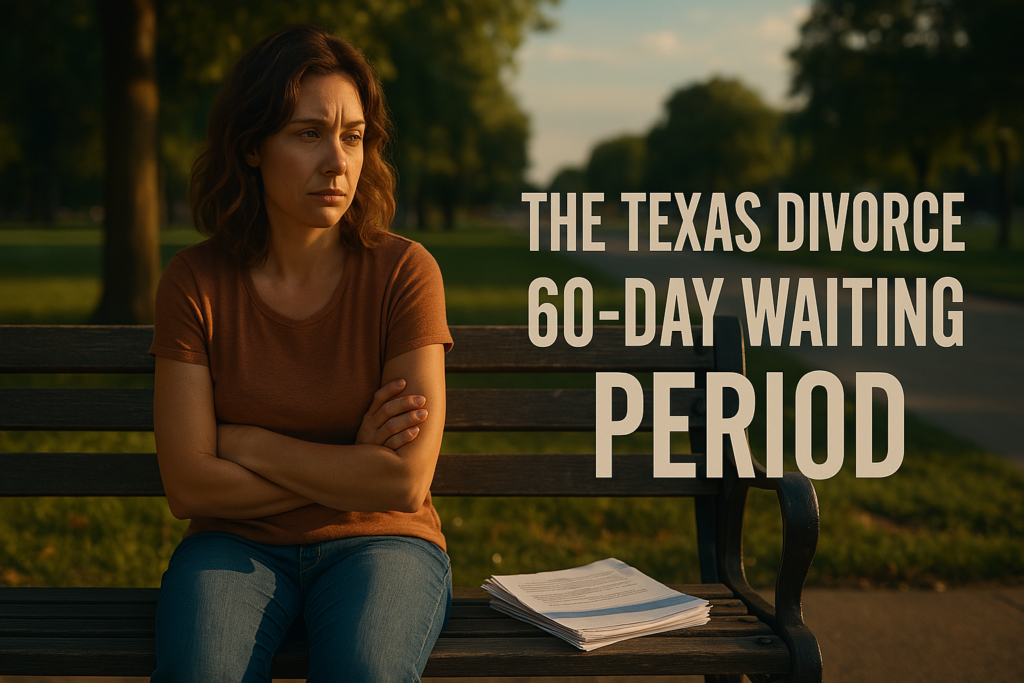
You’ve made the decision. You’ve filed the paperwork. You’re ready to move on with your life—but now you’re stuck in limbo because of The Texas Divorce 60-Day Waiting Period, which is exactly what it sounds like: a mandatory pause before your divorce can be finalized, no matter how ready you are to be done. Sound frustrating? You’re not alone. Many Texans are surprised to learn that even in an uncontested divorce, they can’t just file today and be free tomorrow.
Short answer: The Texas Divorce 60-Day Waiting Period means you have to wait at least 60 days after filing your divorce petition before a judge can grant your divorce. But don’t worry—there’s still plenty you can do during that time to prepare, organize, and make sure your case goes smoothly.
In this blog, we’ll break down exactly why this waiting period exists, when it starts and ends, who might be exempt, and how to use those 60 days to your advantage. Whether you’re eager to move out, share custody, or simply update your Netflix password without guilt, this guide will help you get through the wait like a pro. Keep reading—we’ve got answers, timelines, tips, and a few sanity-saving suggestions for navigating The Texas Divorce60-Day Waiting Period with clarity and confidence.
Key Takeaways
- The Texas Divorce 60-Day Waiting Period is a mandatory pause that allows couples time to reconsider their decision to divorce and prepare for legal processes, starting from the date the divorce petition is filed.
- This period applies to nearly all divorce cases in Texas, whether contested or uncontested, and although it usually spans 60 days, various factors may lead to longer timelines for finalization.
- Specific exceptions to the waiting period exist, such as cases involving family violence, which can expedite the divorce process, emphasizing the importance of understanding legal requirements and utilizing the waiting period productively.
What Is the Texas Divorce 60-Day Waiting Period?
At the Law Office of Bryan Fagan PLLC, we want clients to fully understand the timeline involved in a Texas divorce—starting with The Texas Divorce 60-Day Waiting Period. Under Texas Family Code § 6.702, courts are prohibited from finalizing a divorce until at least 60 days have passed from the date the original petition is filed. This rule applies to nearly every divorce case in Texas, whether contested or uncontested, and is designed to give both spouses time to reflect, prepare, or even reconcile before ending their marriage. Unless exceptions such as family violence apply, this waiting period cannot be waived.
The 60-day clock begins the moment the petition is filed, but reaching the 61st day doesn’t guarantee that your divorce will be completed on that day. Many divorces take longer due to unresolved issues like child custody, asset division, or spousal support. Negotiations, mediation, or scheduling delays can all extend the timeline. That’s why this waiting period should be viewed not as a delay, but as a strategic opportunity. By working with an experienced attorney, you can use this time to gather financial records, prepare parenting plans, and position yourself for a more efficient final hearing.
For those pursuing a no-fault divorce, understanding how to navigate or even accelerate the process is crucial. Learn more about what to expect and how to streamline your case in our guide on no-fault divorce in Texas. At the Law Office of Bryan Fagan PLLC, we’re committed to helping you move forward confidently—every step of the way.

Key Points About the 60-Day Waiting Period
At the Law Office of Bryan Fagan PLLC, we emphasize the importance of understanding The Texas Divorce 60-Day Waiting Period, especially for couples pursuing an agreed divorce. Under Texas Family Code § 6.702, this waiting period begins the day a divorce petition is filed and concludes on the 61st day. Its primary function is to provide a buffer—time for both spouses to reconsider the decision to divorce, work through disagreements, and ensure they’re making informed choices about their future. However, this timeframe does not guarantee a finalized divorce once the 60 days have passed. Delays can still occur due to unresolved disputes or legal complexities, even in agreed divorces.
The Texas Divorce 60-Day Waiting Period applies to nearly all divorce cases in the state, regardless of whether they are contested or uncontested. The law is clear: judges are not allowed to sign a final divorce decree until the full 60 days have passed, barring limited exceptions like family violence. This pause is not just a technicality—it’s a legal opportunity to gather financial documents, prepare parenting plans, and work toward a smoother resolution. Couples can use this period to negotiate terms, attend mediation if necessary, and begin organizing their post-divorce life. For those who are on the same page, this time can actually be productive and lead to fewer issues down the line.
If you and your spouse are seeking to move forward efficiently with minimal conflict, it’s critical to know how to avoid unnecessary delays. For a step-by-step guide on navigating an agreed divorce with confidence, read our resource on how to file for an agreed divorce in Texas without delays. At the Law Office of Bryan Fagan PLLC, our experienced legal team is here to help you use The Texas Divorce 60-Day Waiting Period to your advantage—ensuring every detail is handled right the first time.

Why Does the 60-Day Waiting Period Exist?
At the Law Office of Bryan Fagan PLLC, we believe that The Texas Divorce 60-Day Waiting Period plays a vital role in helping individuals navigate the divorce process with clarity and care. According to Texas Family Code § 6.702, the state mandates this waiting period not simply as a formality, but as a built-in safeguard. It allows both parties time to pause, reflect, and ensure that the decision to end the marriage is not made impulsively. In many cases, this cooling-off period gives couples an opportunity to reconsider reconciliation or take a more thoughtful approach to separation, aligning their choices with long-term emotional and financial well-being.
Beyond emotional clarity, The Texas Divorce 60-Day Waiting Period serves critical legal functions. It ensures that both spouses have sufficient time to prepare for the legal aspects of divorce. Whether that means compiling financial records, establishing parenting arrangements, or working through spousal support terms, this period provides a structured window to address these matters carefully. By allowing time to evaluate and negotiate essential elements, the waiting period reduces the risk of rushed or one-sided decisions and promotes equitable outcomes for both parties.
For individuals just beginning the divorce process, it’s essential to understand how this waiting period fits into the broader legal timeline. Our team has prepared a helpful guide on streamlining the application for divorce and getting started with confidence. At the Law Office of Bryan Fagan PLLC, we are committed to helping clients use The Texas Divorce 60-Day Waiting Period effectively—transforming what feels like a delay into a strategic phase of preparation and empowerment.

Exceptions to the 60-Day Waiting Period
At the Law Office of Bryan Fagan PLLC, we recognize that while The Texas Divorce 60-Day Waiting Period is a standard legal requirement in most divorce cases, there are important exceptions outlined in Texas Family Code § 6.702(b). The most significant of these exceptions applies in situations involving family violence. If one spouse has committed an act of family violence against the other, the court may waive the mandatory waiting period. This waiver allows the divorce to proceed without delay, protecting the safety and well-being of the abused party.
To qualify for an expedited divorce in these cases, the filing party must provide credible evidence of family violence. This may include a valid protective order, a magistrate’s emergency protective order, or documentation of a criminal offense involving family violence. Along with this proof, a formal motion to waive The Texas Divorce 60-Day Waiting Period must be submitted to the court, clearly stating the grounds for the exception. The court will review this request carefully to ensure the legal process continues with urgency while safeguarding the rights of all parties involved.
These exceptions are critical for Texans facing unique and often dangerous circumstances. If you are navigating a divorce under such conditions, it’s vital to seek immediate legal assistance. For a closer look at the complexities many individuals face in the divorce process, visit our guide on the distinctive difficulties of undergoing divorce in Texas. At the Law Office of Bryan Fagan PLLC, we are here to help you understand your rights and options when safety and time are of the essence.

Using the Waiting Period Productively
At the Law Office of Bryan Fagan PLLC, we understand that The Texas Divorce 60-Day Waiting Period can feel like an unnecessary roadblock when you’re ready to move forward. However, this mandatory pause—required under Texas Family Code § 6.702—is actually a valuable opportunity for strategic preparation. Far from being wasted time, this waiting period can be used to organize financial documents, participate in mediation, and negotiate settlement terms. Taking advantage of this time can significantly increase the chances of a smoother, more efficient divorce process once the 60 days have passed.
By proactively addressing unresolved issues during The Texas Divorce 60-Day Waiting Period, individuals often find they are better positioned emotionally and legally for what comes next. Tasks such as compiling asset inventories, outlining parenting plans, and consulting with professionals can provide clarity, reduce stress, and help maintain a sense of control throughout the transition. Using this time constructively ensures you’re not caught off-guard once the court is eligible to finalize your divorce.
For a deeper look into how mediation and preparation fit into the final phase of a Texas divorce, we encourage you to read our guide on understanding the finale: timelines and steps for officializing a Texas divorce post-mediation. At the Law Office of Bryan Fagan PLLC, our team is committed to helping clients turn the waiting period into a time of momentum—setting the foundation for a favorable outcome once that 61st day arrives.

Gathering Financial and Parenting Documents
One of the most crucial tasks during the waiting period is gathering essential financial and parenting documents. This includes tax returns, bank statements, proof of income, and recent pay stubs. Having these documents ready can significantly strengthen one’s position during negotiations and ensure compliance with legal requirements. A notary public can also assist in verifying important documents.
Compiling a detailed list of assets and liabilities is also important for effective property division negotiations. Additionally, if children are involved, gathering documents related to child custody and support is essential for establishing clear and fair arrangements. Being well-prepared helps individuals navigate the divorce process more efficiently and avoid unnecessary delays.
Negotiating Terms of the Divorce
Negotiating the terms of the divorce during the 60-day waiting period can prevent delays and lead to quicker resolutions. Effective communication and a willingness to compromise from both parties are key to successful negotiations. Engaging in open discussions about property division, spousal support, and child custody can help clarify and spouses agree on divorce terms, minimizing complications later.
Having a neutral third party, such as a mediator, can also facilitate fair settlements that satisfy both spouses when the parties agree. Negotiating terms during the waiting period can reduce legal fees and emotional stress, leading to a more amicable resolution. This proactive approach can significantly improve the overall divorce process.
Attending Mediation or Counseling
Attending mediation or counseling during the waiting period can be highly beneficial. Mediation offers a constructive environment for couples to address disputes and reach mutual agreements outside of the courtroom. It focuses on collaborative solutions rather than adversarial approaches, reducing the emotional toll of divorce.
In numerous instances, clients who engaged in mediation during the waiting phase achieved quicker and more satisfactory outcomes than those who did not. Counseling can also provide emotional support and help individuals navigate the challenges of divorce. Seeking professional assistance can improve the chances of reaching amicable agreements and transitioning smoothly into post-divorce life.
Preparing for Life After the Waiting Period
As the 60-day waiting period comes to an end, it’s essential to stay organized and prepare for the final hearing. Gathering all relevant documents in advance can help prevent unnecessary delays and ensure a smooth divorce process leading to the final decree. Consulting with an experienced attorney can provide clarity and support, helping individuals avoid costly legal mistakes and protect their interests.
Developing a clear parenting time plan is also crucial for those with children. A well-defined plan can facilitate smoother negotiations regarding custody and child support, enhancing the chances of favorable arrangements. Temporary orders can provide immediate solutions for custody, support, and living arrangements during the waiting period, ensuring stability for both parties.
Utilizing the waiting period productively helps individuals set themselves up for a more organized and efficient divorce process. Staying proactive and seeking professional assistance can make a significant difference in achieving a positive outcome.

Real-Life Scenarios: Success Stories
Real-life success stories illustrate the benefits of using the waiting period productively. Take Jane, for example, who faced numerous challenges during her divorce proceedings. With the support of her experienced attorney, she managed to navigate the waiting period effectively. By compiling necessary financial documents and communicating openly with her ex-spouse, Jane was able to streamline the process and achieve a satisfactory outcome.
Jane’s experience highlights the importance of legal representation in achieving positive results while navigating the complexities of the legal aspects of the legal process during the waiting period. Professional guidance helps individuals manage their expectations, protect their interests, and ultimately reach a favorable resolution, as the court may influence the outcome of deferred adjudication during the court hearing.
Key Takeaways: Texas 60-Day Divorce Waiting Period
If you’re navigating the Texas Divorce 60-Day Waiting Period, consulting with a divorce attorney can provide invaluable insights and support. An experienced attorney can help you understand the legal requirements, gather necessary documentation, and negotiate terms effectively. The Law Office of Bryan Fagan PLLC is dedicated to helping individuals make the most of every step in understanding Texas law and the Texas family court 60-Day Waiting Period.
Don’t face this challenging time alone. Reach out to the Law Office of Bryan Fagan PLLC today for expert guidance and support from experienced divorce attorneys. Our team is here to help you navigate the complexities of the divorce process and ensure a smooth transition into post-divorce life.
Conclusion:
So, what can you do during those 60 days besides watching the clock tick and bingeing courtroom dramas? Plenty. Think of The Texas Divorce 60-Day Waiting Period as your legal version of a “cooling-off” period—except instead of returning a sweater, you’re wrapping up a marriage. It’s your chance to gather documents, draft parenting plans, or maybe even rediscover the joy of solo grocery shopping without anyone judging your snack choices.
Use this time to organize, reflect, and plan your next chapter. Yes, the waiting might feel like the DMV line of your love life—slow-moving and unavoidable—but it’s also a chance to lay the groundwork for a smoother, smarter transition.
And hey, if you’re feeling overwhelmed, remember this: you don’t have to do it alone. The Law Office of Bryan Fagan PLLC is here to guide you every step of the way. Whether you need help understanding your rights, finalizing paperwork, or just want someone to confirm that, yes, your ex is being unreasonable—we’ve got your back.
Because 60 days might feel like forever, but with the right help? It’s just the beginning of something better.
FAQ – The Texas Divorce 60-Day Waiting Period
Yes, Texas law requires a 60-day waiting period after filing for divorce before it can be finalized. This applies to most cases, even if both parties agree on all terms.
The 60-day waiting period is a mandatory timeframe imposed by Texas law that begins when the divorce petition is filed. A divorce cannot be finalized until at least 60 days have passed, giving both parties time to reflect or negotiate terms.
If both parties agree on everything, the divorce can be finalized as soon as the 60-day waiting period is over. In uncontested cases, this is often the fastest timeline possible.
Yes, the 60-day waiting period acts as a “cooling-off” period, allowing couples time to reconcile, consider mediation, or work out a fair settlement before the divorce is granted.
The fastest you can get a divorce in Texas is after the 60th day from the date of filing, unless there is a qualifying exception, such as a case involving domestic violence.
In Texas, you must wait 30 days after your divorce is finalized before you can legally remarry, unless the court waives this waiting period.
Rule 60(b) is part of the Federal Rules of Civil Procedure and allows a party to request relief from a final judgment under certain conditions, such as mistake, fraud, or newly discovered evidence. It’s not a Texas-specific divorce rule but can apply in federal cases.
A divorce becomes final when the judge signs the Final Decree of Divorce and files it with the court. This typically occurs at or after a prove-up hearing once the 60-day waiting period has passed.
Divorce after age 60—often called “gray divorce”—is becoming more common. Many older couples choose divorce for reasons like growing apart, retirement lifestyle differences, or seeking fulfillment in their later years.








